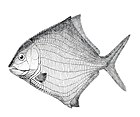Coccocephalus
| Coccocephalus Temporal range: | |
|---|---|
| Scientific classification | |
| Domain: | Eukaryota |
| Kingdom: | Animalia |
| Phylum: | Chordata |
| Class: | Actinopterygii |
| Family: | †Coccocephalichthyidae Fowler, 1951 |
| Genus: | †Coccocephalus Watson, 1925 |
| Type species | |
| †Coccocephalus wildi Watson, 1925 | |
| Other species | |
| |
| Synonyms | |
| |
Coccocephalus is an extinct genus of prehistoric freshwater and marine basal ray-finned fish from the Carboniferous to the early Permian period.[1] The type species, C. wildi, lived during the Bashkirian age of the Pennsylvanian epoch in what is now Lancashire, United Kingdom. One specimen of C. wildi is notable for having the earliest known instance of fossilized brain tissue in a vertebrate.[2]
Taxonomy
The type species was first described as Coccocephalus wildi in 1925 by David Meredith Seares Watson, but because Coccocephalus was thought to be preoccupied (for an extant hemipteran insect), both Gilbert Percy Whitley[3] and Errol White & James Alan Moy-Thomas[4] proposed a new genus name in 1940. Because the article introducing the name Coccocephalichthys Whitley, 1940 was published before the article erecting the name Cocconiscus White & Moy-Thomas, 1940, the former became the valid new genus name for the Carboniferous fish for some time. However, reexamination of Fieber's 1861 insect publication in 1996 revealed that the insect in question is Coccodocephalus, thus the original name Coccocephalus wildi stands as the correct name for this genus and both Coccocephalichthys and Cocconiscus are junior synonyms. [5]
- Family †Coccocephalichthyidae Fowler, 1951 [Cocconiscidae Romer, 1945][6]
- Genus †Coccocephalus Watson 1925 [Coccocephalichthys Whitley, 1940; Cocconiscus White & Moy-Thomas, 1940]
- †C. baldwini (Poplin, 1974) - latest Carboniferous (Gzhelian) of Kansas, USA, marine (Lawrence Formation) [Coccocephalichthys baldwini (Poplin, 1974); Cocconiscus baldwini Poplin, 1974][7]
- †C. tessellatus Beltan, 1981 - Early Permian (Asselian) of Uruguay, marine (San Gregorio Formation)
- †C. wildi Watson, 1925 - Late Carboniferous (Bashkirian) of England, freshwater (Pennine Coal Measures) [Coccocephalichthys wildi (Watson, 1925); Cocconiscus wildi (Watson, 1925)]
- Genus †Coccocephalus Watson 1925 [Coccocephalichthys Whitley, 1940; Cocconiscus White & Moy-Thomas, 1940]
Coccocephalus is suggested to belong to the stem-group of Actinopterygii, with all living ray-finned fish more closely related to each other than to Coccocephalus.[8]
Ecology & evolution
In 2023, the type specimen of C. wildi was found to preserve the earliest example of fossilized brain and nerve tissue. The fossil shows that the forebrain in this ray-finned fish was evaginated, a feature otherwise not known in actinopterygians. The results show that the everted forebrain of modern ray-fins evolved later than previously thought. The exceptional preservation of this specimen likely occurred due to the individual being rapidly buried in a low-oxygen environment after death, preventing decomposition of the brain tissue.[2][9][10][11]
See also
References
- ^ "PBDB Taxon". paleobiodb.org. Retrieved 2024-05-21.
- ^ a b Figueroa, Rodrigo T.; Goodvin, Danielle; Kolmann, Matthew A.; Coates, Michael I.; Caron, Abigail M.; Friedman, Matt; Giles, Sam (2023). "Exceptional fossil preservation and evolution of the ray-finned fish brain". Nature. 614 (7948): 486–491. Bibcode:2023Natur.614..486F. doi:10.1038/s41586-022-05666-1. PMID 36725931. S2CID 249475791.
- ^ Whitley, Gilbert P. (1940). "The nomenclator zoologicus and some new fish names". Australian Naturalist. 10: 241–243..
- ^ White, Errol I.; Moy-Thomas, James A. (1940). "XLVIII.—Notes on the nomenclature of fossil fishes.—Part I. Homonyms A-C". Annals and Magazine of Natural History. 11. 5 (30): 502–507. doi:10.1080/00222934008527067.
- ^ Poplin, Cécile M.; Véran, Monette (1996). "A revision of the actinopterygian fish Coccocephalus wildi from the Upper Carboniferous of Lancashire". Special Papers in Palaeontology. 52: 7–29.
- ^ "Part 7- Vertebrates". Collection of genus-group names in a systematic arrangement. Archived from the original on 5 October 2016. Retrieved 30 June 2016.
- ^ Poplin, Cécile (1974-01-01). Étude de quelques paléoniscidés pennsylvaniens du Kansas (in French). FeniXX. ISBN 978-2-271-09611-1.
- ^ Figueroa, Rodrigo T.; Weinschütz, Luiz Carlos; Giles, Sam; Friedman, Matt (June 2024). "Soft-tissue fossilization illuminates the stepwise evolution of the ray-finned fish brain". Current Biology. doi:10.1016/j.cub.2024.05.027. PMID 38866006.
- ^ Orie, Amarachi (2023-02-02). "A 319-million-year-old brain has been discovered. It could be the oldest of its kind". CNN. Retrieved 2024-05-21.
- ^ "319-million-year-old fish preserves the earliest fossilized brain of a backboned animal". University of Michigan News. 2023-02-01. Retrieved 2024-05-21.
- ^ "World's oldest preserved brain found in prehistoric fish fossil". BBC. 2023-02-02. Retrieved 2024-05-21.








